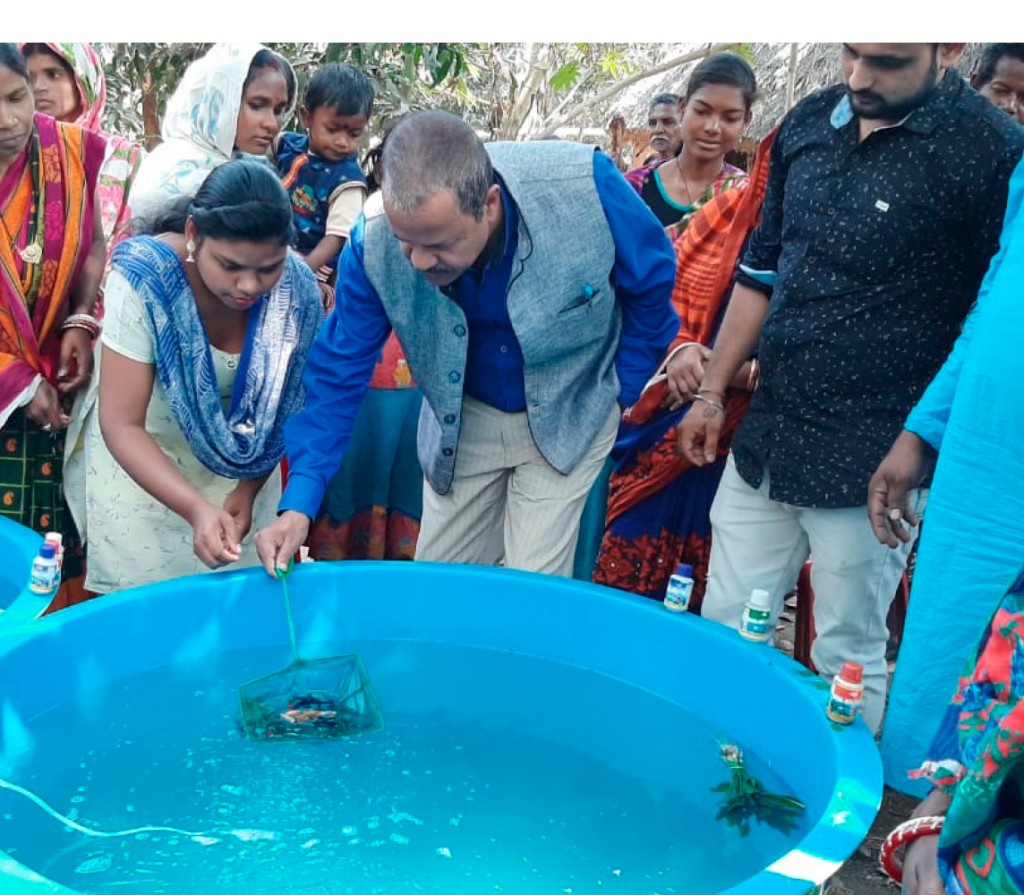We aren’t just breeding fish, we are cultivating self-worth too,” says Manjulata Hembrum, a resident of Chunakoli, a riverside village tucked in the Sundarbans area of West Bengal. Adopted by RC Bhubaneswar Ekamra Kshetra, RID 3262, in 2014, the village has since seen “only good days. Almost every woman in the village can read and write, sign her name, all thanks to the adult literacy centre set up by the club. Some of us have enrolled in multiple skill development programmes conducted by the club which helps us earn a living and raise our voice against domestic violence,” she adds.

Starting with the club’s adult literacy centre Swabhiman Kendra, to the skill development programmes that teach making cloth bags, incense sticks, growing mushrooms and promoting ornamental fish farming as a livelihood option, the club is focused on making the village women economically independent. “When a woman is empowered to manage a small business and her home, as an earning member of the family she slowly realises her potential to contribute towards the holistic development of not just her family but her community too,” says club president Dr Bani Sen Gupta.

Fifteen women from this village were recently selected as beneficiaries for an ornamental fish farming initiative by the club, in association with the Central Inland Fresh Water Research Institute (CIFRI). The beneficiaries were taken to CIFRI, Barrackpore, for a three-day training programme in February. The expenses for travel, food, lodging, training and study material which otherwise cost ₹30,000 a beneficiary were taken care of by the CIFRI. “This was possible only because of Basanta Kumar Das, president of RC Bhubaneshwar Royal who is the director of CIFRI, Barrackpore,” says Bani. During the lockdown when the women had to stop making cloth bags and incense sticks as sales came to a standstill, “Das suggested that ornamental fish farming will keep them occupied until the fish breed and generate a steady income once the lockdown was lifted,” she adds. After the training each of them received fibreglass portable fish tanks, equipment, fish feed and fish fingerlings in the presence of PDG Sibabrata Dash.
When a woman is empowered to manage a small business and her home, as an earning member of the family she realises her potential to contribute towards the holistic development of not just her family but her community too.
Ornamental fish breeding which started as a hobby around the world has turned out to be a commercial trade activity, explains Das. The major export destination for Indian ornamental fish are Singapore, Japan, USA, Malaysia and Germany. “This sector has been recognised for its ability to generate employment opportunity, alleviate poverty and contribute towards national growth by promoting international trade,” he says.
Rameswar Das, a local trainer and entrepreneur in ornamental fish farming who handles the training for this initiative, says that being natural nurturers, women understand better the fish breeding process, and can quickly develop the skill to prepare feed, treat sick fish and care for the newborn fish. “They apply their hearts to it because their families depend on them for food. They are determined to improve the lives of their children even if that means doing menial jobs in the fish market like cleaning fish, or peeling, and de-heading shrimps. Ornamental fish farming helps them earn a little extra without the intimidation of looking for employment outside their homes.” To make matters easy for the rural women Das has offered to pay the auto fare for those visiting his shop in Bhubaneswar to trade their ornamental fish or clear their doubts on the subject. The women from Chunakoli are currently nurturing six species of ornamental fish such as goldfish, zebra danio and black widow tetra.
Mushroom cultivation
Also undertaken by the club during the lockdown was a mushroom cultivation programme for women from Damana Basti near Bhubaneswar. A partnership with the Horticulture Department of Malkangiri through Rtn Gopinath Kar, horticulture officer and member of RC Bhubaneshwar Confluence, led to the training of 15 underprivileged women. Bani funded and sourced the raw material for these women to start mushroom cultivation in their own homes at a total cost of ₹4,500. The initiative has taught them to make the right kind of compost, harvest and cultivate mushrooms. Lessons on how to spawn and multiply a harvest were also imparted to them. “This is an easy method that can be done indoors and does not need much space. The beneficiaries have completed the second harvest of oyster mushrooms and are beginning to grow button mushrooms for the summer,” says an excited Bani.
Being natural nurturers, women understand the fish breeding process, and can quickly develop the skill to prepare feed, treat sick fish and care for the newborn fish.
The club members visit both projects regularly to check on the development and have transformed the village school in Chunakoli into a Happy School with gender-segregated toilet blocks, a library, and a well-maintained campus. On the occasion of International Women’s Day, the club conducted a seminar on women’s rights followed by a cultural programme. Bani says, “We want to catch them young and make the girls aware of important things. They also know that whenever required, they can reach out to us or local authorities. We will be carrying out more such awareness drives in the future.”






